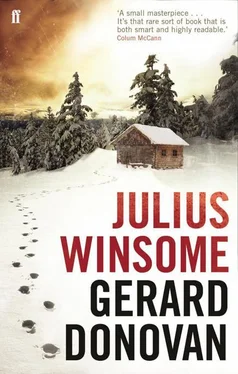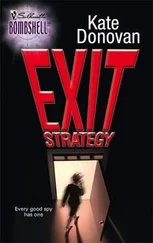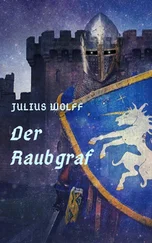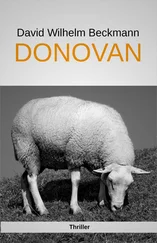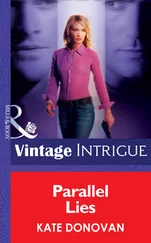This was the place. Hobbes had made it five hundred yards with a shotgun blast in him, shot from two feet away. I looked along the trail and saw the roof of the cabin where the trees dipped. Five hundred yards to get back to the cabin. I traced the ground, bending to and fro, looking for footprints but found none: the wind in the grass had erased them.
IT WAS LATE IN THE AFTERNOON. I HAD LET THE FIRE go out.
I sat in the New England chair as the woods grew quiet and hard and dark around the cabin and wondered what my father would have said to all of this, what he would have thought of a grown man, his son, all out of sorts over some lead and a dog, sitting by a cold fire, if such a thing existed, sitting there in the dark with something else that crept in the door and was standing nearby, a feeling or tainted air that would not be ignored but would not identify itself, moving from room to room rustling furniture and drapes before coming to the living room with its arms folded as if to say, what now, now what. I sat in the chair as the room light fell in sympathy with the woods, and I did nothing to win the room back, did not stir to read or make some tea or listen to the shortwave radio. My father would not have stood for it, he would have snapped his book shut and told me to snap out of it. He had seen too much fighting, and his father had seen too much fighting before him. My blood was weaned off guns by two world wars.
Yet the yellow cartridge and the blood haunted me, a small action at the edge of a trail in a forsaken part of the world.
* * *
My father said that his father carried so many wars on his chest it was a wonder he could stand straight: medals from the Boer War, the First World War, and other small wars no one hears of anymore, skirmishes in the bush and such, scores or hundreds briefly dead and then wiped from history. He never fired a rifle after he came back from that war, and before he died, my grandfather gave his medals to my father and told him to keep them or to throw them away, he didn’t care which.
I wonder why he would say such a thing, I said to my father one day, to which he said, World War One, and the Battle of the Somme, the lonely farmland in France where a million men fell to the ground: half a million British, two hundred thousand French, and over five hundred thousand Germans, shot or blown up by ordinance, where the Allies fired a week-long artillery bombardment of fifteen hundred guns and 1.6 million rounds before the opening assault and still lost fifty-eight thousand troops on the first day alone. How many people, Julius, do you think remember any of that?
Few people, maybe nobody, I said.
And that was barely eighty summers ago, he said. That’s why your grandfather didn’t care.
He took a deep-blue velvet box from the shelf and opened it, and there were the medals, heavier than I thought they should be.
But you kept them all the same, I said.
He nodded, the fire staining his spectacles, swallowed, and shut the box and went back to reading, and I left him alone for a while because he was a man who did not say much of what he felt.
He himself had fought in Holland in 1944 during the last desperate months of the Second World War when men claimed each building by the brick and fell in wet streets. At the end of it he threw away his carbine and came home, done with any kind of killing, and he never shot anything after that either.
I kept my grandfather’s medals in the velvet box. You don’t throw a million men away like that.
I GOT THE FIRE TO BURN HIGH ON SOME FRESH LOGS and sat before it with a mug of tea, watching the orange flames roar through the tempered glass. At such times, in the moments before I took up anything to read that is, silence sometimes took hold of me. Now that the hard weather had come, snow would follow and stay the winter. For some days past I heard the last of the Canada Geese cross the sky above the woods and fall in a deluge of cackles over the fields to rest on their way south to breeding grounds, stay silent for the night, hundreds of them on the plain, then rise with a thousand wings in the morning and circle until they drew an arrow in the sky under the sun, their compass south. This time of year stirred the restlessness in me too, perhaps because I saw how most creatures, when faced with a change in weather, either settle down or get out of town.
I had now lived fifty-one years in this cabin. In the summer months I worked some landscaping for the rich, mostly out-of-towners with holiday homes, and that suited me fine, since my business stayed my business, as those kinds of people don’t generally want to be talking to anyone local. Along with that I did some machine work for an automobile shop fixing troublesome engines for the proprietor, a man who dangled at the end of an oily black rag and was glad to see me every spring, said I was a wonder with a machine, any machine on the face of the known world. I made enough from both jobs to sit out and survive the winter, and that was good, what you don’t need isn’t yours, my father said. But that was all I did, sit out the winter. I wondered if there was somewhere else in the world for me, and if I should have gone to the university, and what I would have done with my life if I did. I had never quite settled down or left and know I should have done more with my mind. If I were to write my life in one sentence up till now, I would say that at one point I lived in a cabin for fifty-one years.
ON WEDNESDAY I WOKE LATE WITH THE COVERS wrapped tightly around me all the way to my eyes, the way I slept. I had worn my long coat and socks to bed and fell asleep in them with the windows open for the fresh air. My breath rose in a fog of droplets as I gathered the courage to rise into the chill and boil some water for tea.
After some toast and butter I dressed in a sweater and my coat and a good pair of boots and walked to the barn. On the way I noticed that the orange and yellow nasturtiums had shriveled in their beds: the three nights in a row of even light frost had killed them. I could take away the plastic covering now, but all that for later. It was a very fine morning and some birds blew from one branch to another, swooping down for the seed I threw them and the hot water I put in the concrete fountain.
I shoved aside the door of the barn and made for the bench at the far end and unwrapped the rifle from the leather cover. I checked the bore, cleaned the chamber with solvent, and tested the trigger mechanism. From a closet I retrieved a bag of .303 cartridges in 5-round clips and slipped one into the rifle before closing the door behind me, walking over again to the flowers to see if any were for saving, but they all drooped from their stems, long past rescue. I thanked them for their scent and for what they brought me by way of lifting my spirits all these months. I looked up: a snow flake or two drifted down out of a mostly blue sky, and the air in the clearing swam with the bark of trees in sunshine. I stood a moment at Hobbes’s grave and did not know what to say or think. I would have given every book in the cabin, every penny I had to see him rise again from the hole. I would have forgotten the matter as best I could. But he did not rise, and so we now had come this far.
I set off for the woods with some bread in my pocket and hot tea in a small hip flask, and on a strap across my shoulder, the other thing my grandfather passed on to my father, a World War One Pattern 14 Lee-Enfield rifle.
I HIKED TO A SPOT A MILE AND A HALF INTO THE FOREST, walking in and out of the shade like a man in parts as the broken sun in the branches found me with little light and even less heat, and I walked slowly, for I was in no hurry, and even paused along the way to take a sip of the tea, wondering how anything in the world could feel warm in Maine, and how anyone could sneak up on any living thing in the late fall when the dry leaves cracked under boots so much. In summer these trees had formed a lush sanctuary from the heat; now most stood bare before the northern winds, sifting nothing.
Читать дальше
